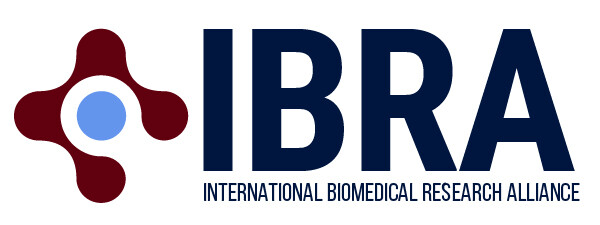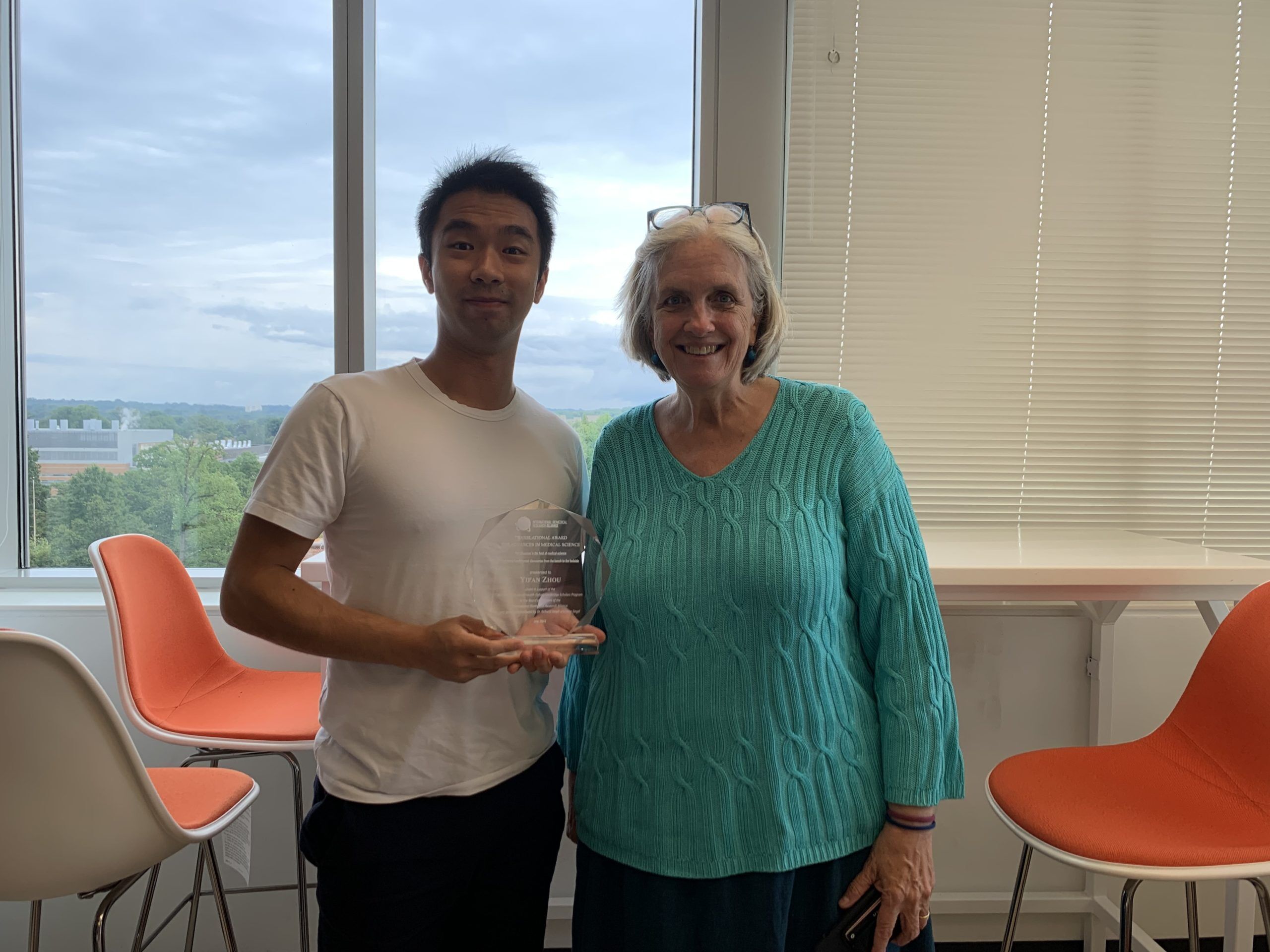
by biomed | Sep 23, 2022 | News
First awarded in 2016, the Dr. Richard and Vera Siegel Translational Award was generously endowed by NIH M.D./Ph.D. Partnership Program co-founder, Dr. Richard Siegel, and his wife, Vera. This annual award recognizes advances in the field of medical science that move fundamental discoveries from the bench to the bedside. The recipient of the Translational Award this year was the Class of 2018 NIH-Cambridge Ph.D. Scholar Yifan Zhou who is jointly mentored by Dr. Cindy Dunbar at the National Heart, Lung, and Blood Institute (NHLBI/NIH) and Professor George Vassiliou at the University of Cambridge.
Yifan’s nominator detailed that he masterfully completed his planned project as well as pivoted to new projects when his plans were disrupted by the pandemic. Despite the many challenges that were thrown at him, Yifan completed one of his two initially planned primary projects, demonstrating that macaques are a robust model for human age-related clonal hematopoiesis, now accepted and in press at the premier hematology journal Blood, with Yifan as a co-first author. Since there could be a potential link between age-related hematopoiesis (ARCH) and COVID-19 disease severity, Yifan took on a second project and worked with multiple NIH, UK, and Italian collaborators to collect over 500 sets of samples and clinical annotations to test this hypothesis. He performed the sequencing and analyses and worked with statisticians to come to very firm conclusions, that there is no relationship of COVID-severity to ARCH and this work is under revision also with Yifan as the sole first author.
Finally, Yifan designed and began an additional project at the NIH utilizing his experience to create a disease model for RUNX1 deficiency in macaques to ask whether gene therapies for this disorder would likely be feasible and prevent progression to acute myeloid leukemia. This work generated the first model for human RUNX1 deficiency providing important evidence that gene correction therapies would be unlikely to reverse the premalignant phenotype and is currently being submitted to a high-profile translational journal.
Yifan’s work did not stop at the bench. He taught himself to program and perform sophisticated genomic analyses and has mentored two students in his lab who can attest to his generosity, hard work, cheerful outlook, and vast knowledge. By the time Yifan graduates, he will have at least five first-author publications and we are looking forward to his future work and accomplishments.
“I am very humbled to have been awarded the Dr. Richard and Vera Siegel Translational Award at the 2022 NIH Global Doctoral Partnerships Annual Workshop Awards Ceremony, for my research on the implication of clonal hematopoiesis. I wish to dedicate this award to my mentors, Cindy and George, for their unconditional support and faith throughout my PhD both in and outside the lab, and I have been surrounded by the most talented colleagues who have taught me all the skills. I still recall when I interviewed with Cindy and told her that I had zero background in bioinformatics and hematology but would still love to embark on projects driven by large datasets and hopefully make a direct impact in the patient care setting. I was expecting to be turned down, but instead, she just asked me ‘would you be willing to learn, and I said of course. Since then, it has been a wonderful journey with something new to learn each and every day. I am also very grateful for the support from the International Biomedical Research Alliance the OxCam Program that allowed us to continue our research during the pandemic. I also want to give a special thanks to Dr. Richard and Vera Siegel’s generous support for this Award.”
Yifan will be completing his PhD by early 2023, and following this, he plans to move to Boston and extends his research interest and skills into independent postdoctoral positions.
“Vera and I are delighted that Yifan Zhou has been given this award. His studies of age-related clonal hematopoiesis is a great example of translating findings between human and animal models, and his work on RUNX1 lays important foundations for gene therapy in humans. Hearing first-hand from Yifan about pivoting his PhD work towards analyzing the impact of ARCH on COVID-19 outcomes shows how he and so many other young researchers have been able to take advantage of the unique circumstances of the pandemic, learn new techniques, and make unexpected and important discoveries. I wish all the best for Yifan for what I’m sure will be a great career in translational research,” remarked Dr. Richard Siegel.
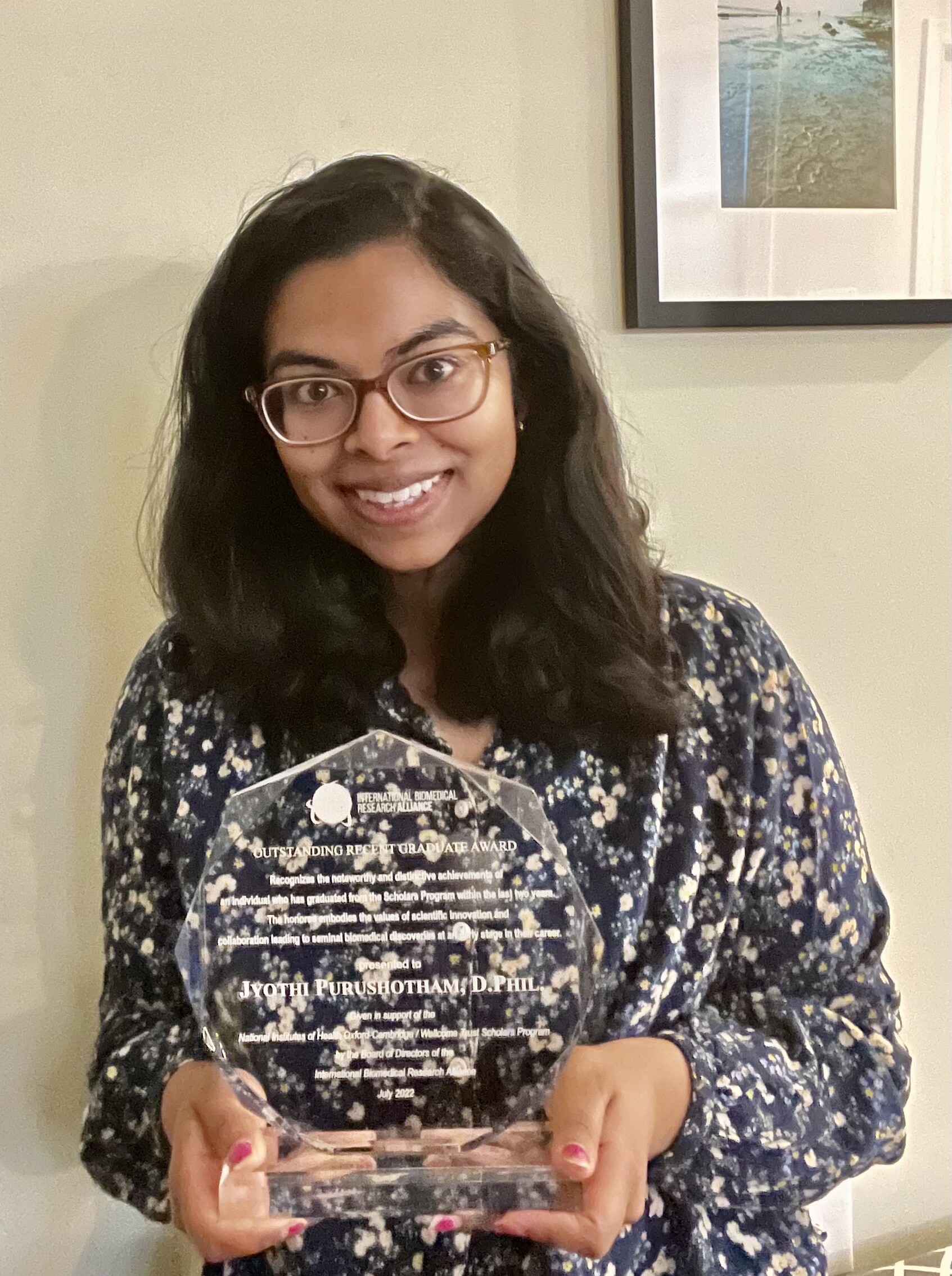
by biomed | Sep 22, 2022 | News
The International Biomedical Research Alliance’s Outstanding Recent Graduate Award was created to recognize the noteworthy and distinctive achievements of an individual who has graduated from the NIH Oxford-Cambridge Scholars Program within the last two years. The honoree embodies the values of scientific innovation and collaboration leading to seminal biomedical discoveries at an early stage in their career. The 2022 Outstanding Recent Graduate Award was bestowed upon Dr. Jyothi Purushotham.
Jyothi Purushotham was an NIH-Oxford D.Phil. Scholar in the Class of 2017, with mentors Dr. Vincent Munster at the National Institute of Allergy and Infectious Diseases (NIAID) working in the NIH’s Rocky Mountain Laboratories in Hamilton, Montana, and Professor Dame Sarah Gilbert at the University of Oxford. Jyothi began her D.Phil. working on the development of a vaccine against Lassa fever virus with Prof. Sarah Gilbert’s group in Oxford and Vincent Munster’s group at NIH. When the Covid-19 pandemic began, Jyothi quickly switched to assist with the development of animal models for SARS-CoV-2 vaccine efficacy testing and played a crucial role in providing data that allowed clinical trials of the Oxford AstraZeneca vaccine to be initiated. Jyothi’s thesis was a mixture of the Lassa and Covid vaccine development work, and one of the examiners at her viva said that she wished they could “award two DPhil degrees, one for each part of the work, as each was worthy of a degree.”
Dr. Purushotham is currently a postdoctoral researcher in the Andersen Lab at The Scripps Research Institute in La Jolla, California. Her research focus remains within the discipline of infectious disease immunology; however, rather than developing vaccines she now studies immune responses to natural infection by viral pathogens. Specifically, her work aims to apply ‘systems biology’ tools to elucidate features of immune dysregulation underlying post-acute infection syndromes, such as after COVID-19 and Lassa fever.
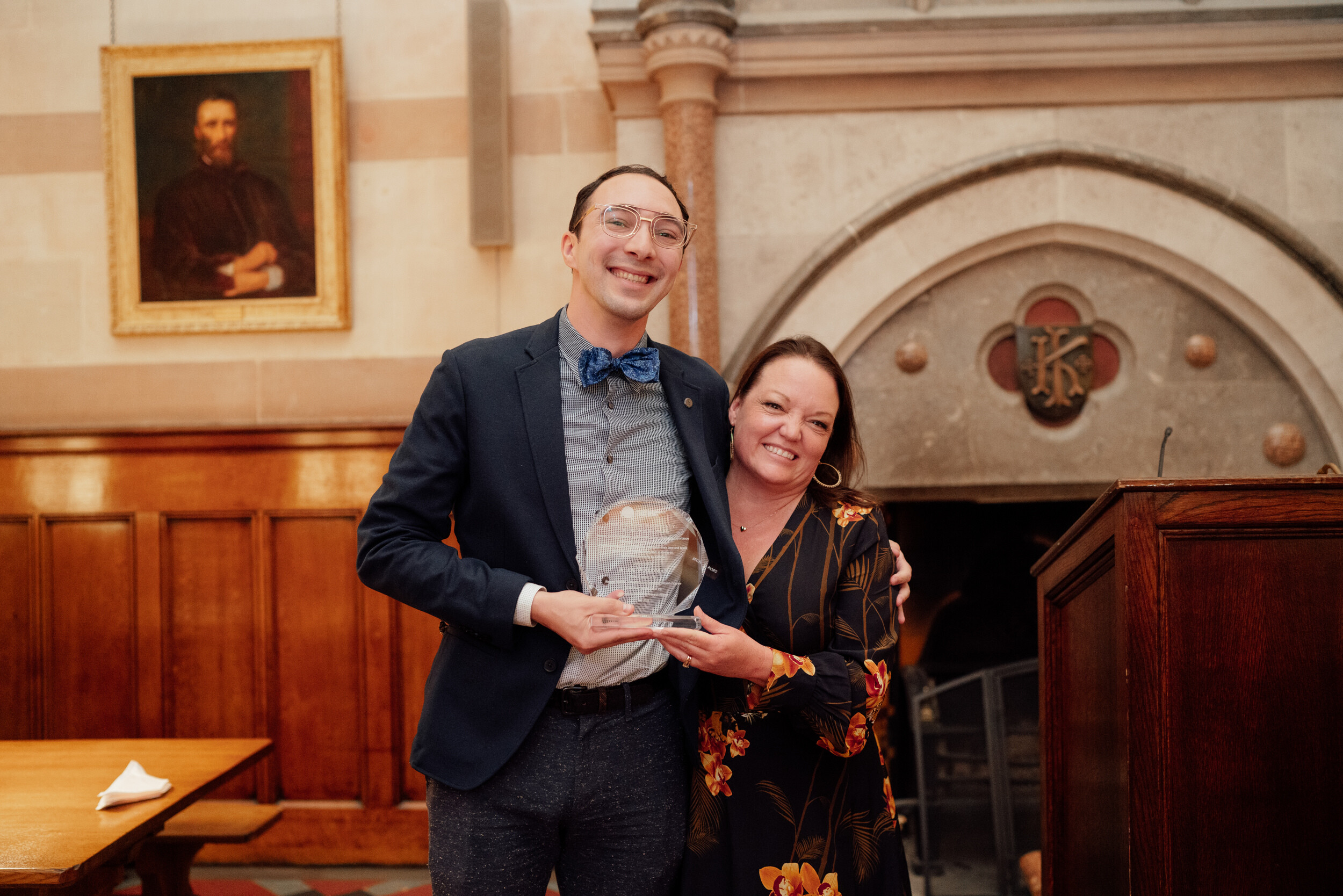
by biomed | Sep 21, 2022 | News
Commencing in 2020, The International Biomedical Research Alliance introduced a service recognition award to honor Scholars in the NIH Oxford-Cambridge/Wellcome Trust Scholars Program who demonstrate exceptional community service. Awardees are nominated by their peers to be recognized for their exceptional service, not only to the Scholars Program but also to the greater NIH and University communities. It is an honor to be recognized, but especially notable when the recognition comes from peers who have a unique and focused view of the awardees and their efforts. The ceremony to honor the winner was held during the NIH Global Doctoral Partnerships Research Workshop held at Keble College, the University of Oxford July 26-28, 2022.
The Building a Better Community Through Service Award recognizes a Scholar for their outstanding service to the community. The Award honors an individual who continuously places significant importance on the well-being of their community. Committed to social responsibility, they invest their time and talent to elevate and inspire others and, in doing so, uplift the community as a whole.
The “Building a Better Community Through Service Award” was bestowed upon Alex Waldman. Alex Waldman is an NIH-Oxford MD/DPhil Scholar in the Class of 2018. His mentors are Dr. Michael Lenardo at the National Institute of Allergy and Infectious Diseases and Professor Gabriele DeLuca at the University of Oxford. He is a medical student at Emory University. Since joining the NIH OxCam Program in 2018, Alex has been dedicated to serving this community. Through numerous positions on the Student Leadership Board, leading the American Physician Scientists Association, and now through leading the Annual Workshop Committee, Alex has consistently demonstrated his values of a strong community and creating spaces for his peers to connect and grow both personally and scientifically. His nominator shared, “his warm, welcoming, and gregarious manner enables him to be inclusive to all members of the community.” Without a doubt, his contributions have directly impacted the strength of the OxCam community and made him eminently deserving of this honor.
Reflecting on winning this award Alex said “The COVID-19 pandemic and the uncertainties it continues to bring have really reinforced to us the importance of fostering a strong community. Therefore, it was particularly heartwarming to receive this honor at our first in-person Workshop in 3 years. As my time in the Program marches toward its conclusion, I have had the pleasure of working closely with the student body, Program leadership, and many members of the International Biomedical Research Alliance which is something that I consider a major highlight of my Ph.D. experience. Once again, thank you to the Directors of the International Biomedical Research Alliance for being such staunch supporters of the Program and the student body. We couldn’t pursue our dream to improve human health through biomedical research and clinical practice without you in our corners each step of the way. I look forward to the next stage of my training and very much hope we get to work together further moving forward.”
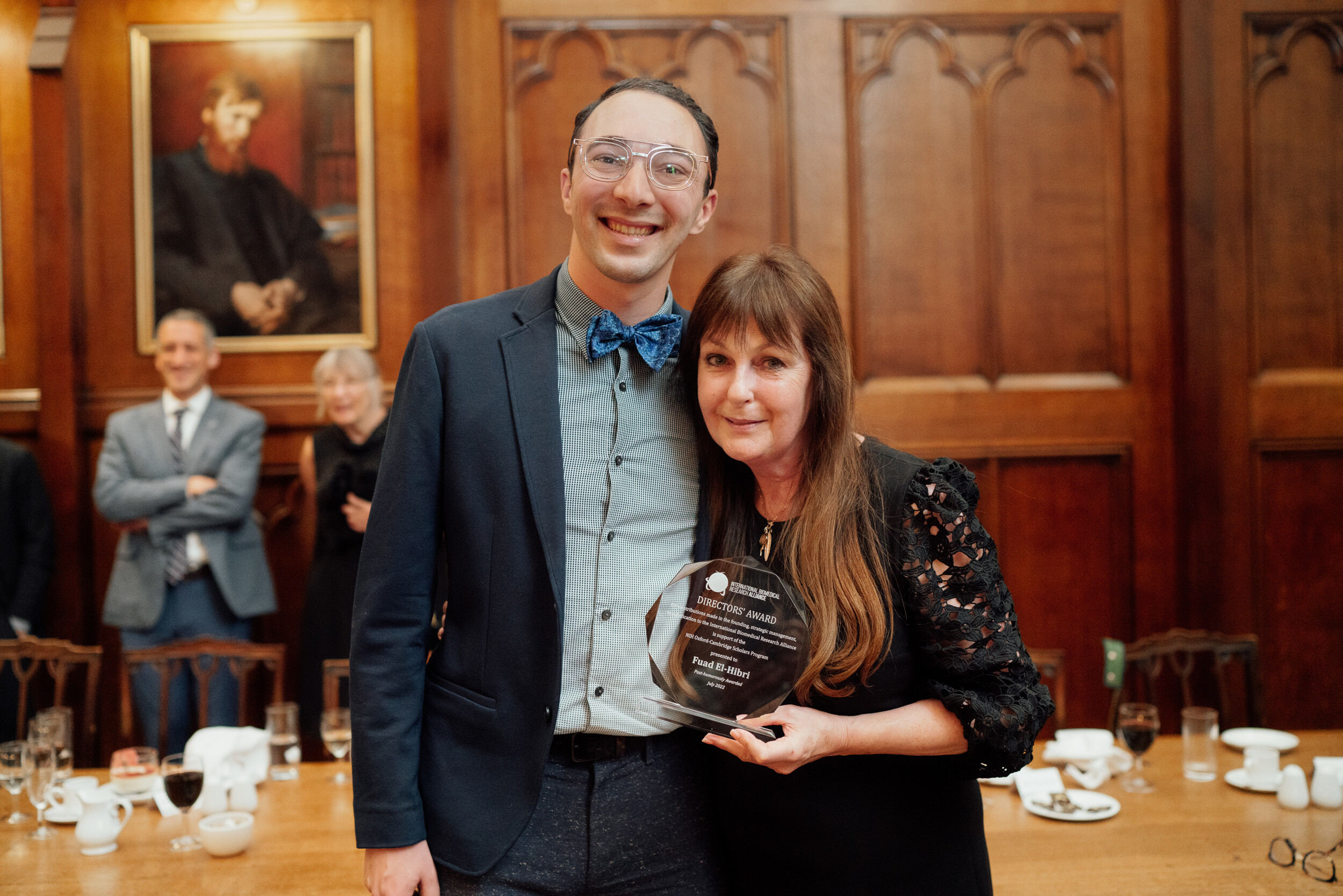
by biomed | Sep 9, 2022 | News
From time to time, individuals who have made extraordinary contributions to the NIH Oxford-Cambridge Scholars Program are singled out to receive special recognition with the “Director’s Award.” Honorees have been selected based on their dedication to the mission of cultivating the next generation of scientists and their selfless service to the Alliance and the Scholars Program.
The ceremony to honor the winners was held during the NIH Global Doctoral Partnerships Research Workshop, titled Global Team Science: Bridging Borders from Bench to Bedside at Keble College, the University of Oxford July 26-28, 2022.
The International Biomedical Research Alliance and NIH-Oxford-Cambridge Scholars Program, alongside the Scholars, bestowed the Director’s Award, posthumously, to Alliance Board Director Fuad El-Hibri, who, after a valiant fight with pancreatic cancer, left this world on April 23, 2022.
In 1998, Fuad founded what would become the publicly traded American multinational biopharmaceutical company Emergent Biosolutions. Fuad served as its Chief Executive Officer for 14 years and its Executive Chairman of the Board of Directors until his retirement in April of this year. His leadership was instrumental in growing the company’s portfolio to its current suite of marketed and procured products for a variety of public health threats, including medical countermeasures for anthrax, smallpox, botulism, and chemical warfare agents, as well as overseeing the company’s role in fighting the opioid crisis. Despite his failing health, he led the company in delivering over 120 million dose equivalents of the COVID-19 vaccine.
Fuad received many accolades for his business successes and philanthropic contributions, especially in protecting and enhancing the lives of millions around the world through life sciences innovation and combating public health threats. He was a recipient of the Vaccine Industry Excellence Award from the World Vaccine Congress. He served on the Board of Trustees of the U.S. Chamber of Commerce and the Yale Healthcare Conference Advisory Committee and had the honor of an annual prize (the Fuad El-Hibri ‘82 Entrepreneurial Award) for students established in his name at the Yale School of Management.
Fuad was a Founding member of the International Biomedical Research Alliance in 2005 and faithfully served on our Board of Directors for 17 years. He and his wife, Nancy, supported several laboratory scholarships for first-year OxCam students at the NIH and graciously hosted student gatherings at their home in Potomac, Maryland. As Chair of the Development & Finance Committee, he led the charge for the construction of affordable student housing close to the NIH campus in Bethesda. One of his final acts as an Alliance Director, just days before his passing, was to make a cornerstone contribution to the construction of a house in the new FAES building project.
Fuad, whose name means “heart” held himself and those around him to the highest level of integrity and excellence. Deeply grounded in faith, he brought people together and encouraged all to be their best in spreading good in this world.
Penelope Rose, his long-time colleague, and friend accepted this award on behalf of Mrs. Nancy El-Hibri and their family.
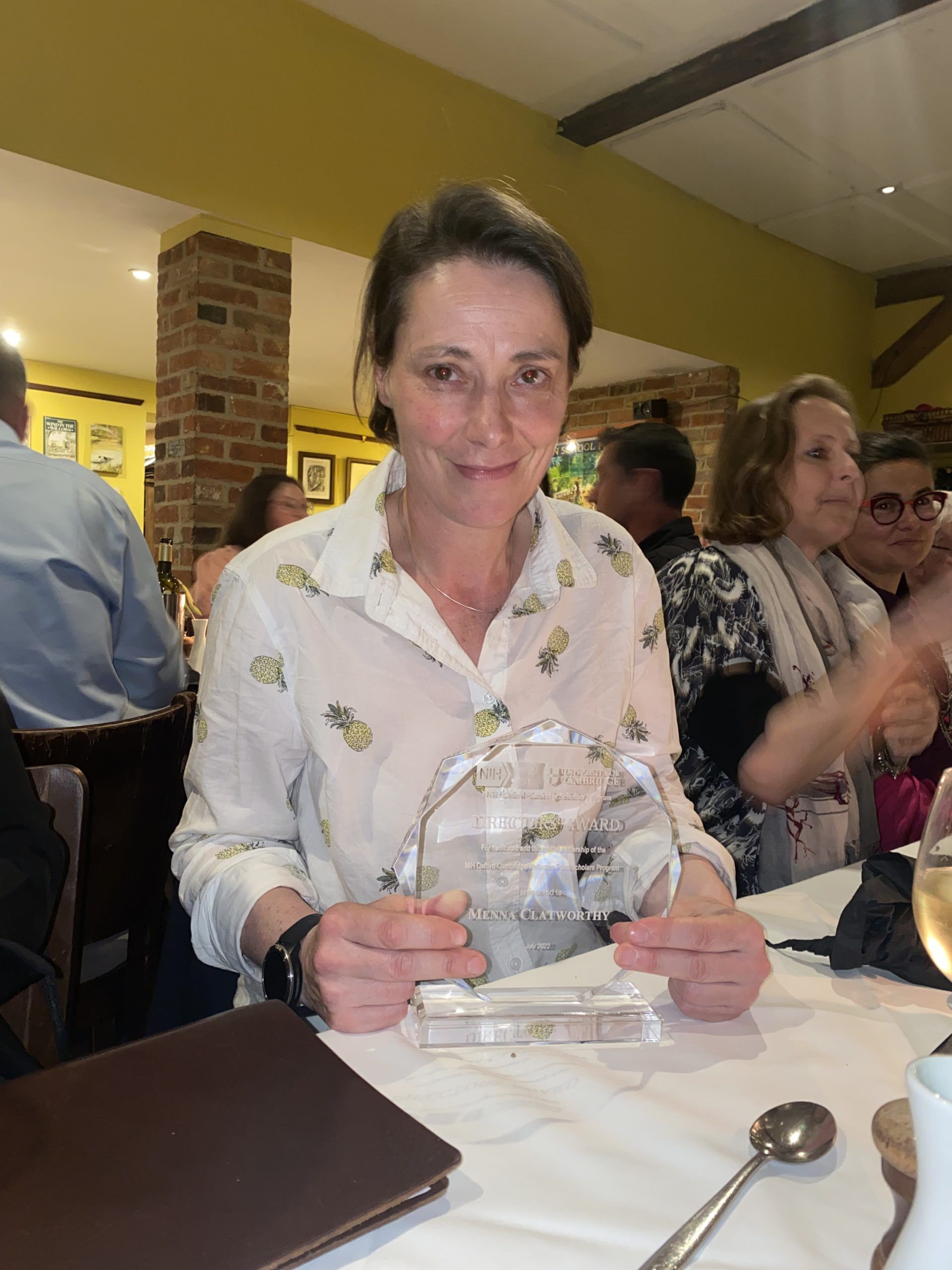
by biomed | Sep 8, 2022 | News
From time to time, individuals who have made extraordinary contributions to the NIH Oxford-Cambridge Scholars Program are singled out to receive special recognition with the “Director’s Award.” Honorees have been selected based on their dedication to the mission of cultivating the next generation of scientists and their selfless service to the International Biomedical Research Alliance and the NIH Oxford-Cambridge Scholars Program.
The ceremony to honor the winners was held during the NIH Global Doctoral Partnerships Research Workshop Gala Dinner celebrated at Keble College, at the University of Oxford.
Professor Menna Clatworthy was honored for her contributions as the longest-standing Director of the NIH Oxford-Cambridge Scholars Program at the University of Cambridge.
Dr. Clatworthy completed her professional training in nephrology and undertook a Ph.D. at the University of Cambridge, investigating the role of antibodies and Fcƴ receptors in autoimmunity and defense against infection.
She was awarded the British Renal Association Raine Award and the Medical Research Society Young Investigator Award for this work. She subsequently obtained a Wellcome Trust Intermediate Fellowship which included an 18-month post-doctoral post at the National Institutes of Health, in Dr. Ron Germain’s laboratory. This work focused on the use of two-photon intravital imaging to examine dynamic behavior of immune cells.
Dr. Clatworthy currently works as a University Lecturer in Transplantation Medicine and divides her time between research, teaching, and clinical practice in transplantation and nephrology. Her laboratory is based within the Department of Medicine wing of the new MRC Laboratory of Molecular Biology. Her group has determined how immune cells derived from the gut are able to defend the meninges lining the brain from microbial invasion and infection. And they have shown how a single molecule within the gut directs the immune response toward wound healing or bacterial defense. When unbalanced, the result can be inflammatory bowel disease.
A cellular immunologist and renal physician in the University’s Department of Medicine, Dr. Clatworthy studied immune cells in peripheral blood, nasal, and lung tissues during the Covid-19 pandemic to explore how the immune system responds to the SARS-CoV2 virus and how this might contribute to pathology. Her group contributed to a collaborative study in which 800,000 immune cells were analyzed to investigate how immune responses differ between asymptomatic cases and people with severe Covid-19. This work was recognized by the European Molecular Biology Organisation (EMBO) who named Dr. Clatworthy as one of their 2022 members.
Dr. Clatworthy has published more than 50 papers, including in journals such as Nature Medicine, Journal of Experimental Medicine, the New England Journal of Medicine, and Cell. Her clinical interests are in transplantation, in particular the effects of B cells and antibodies on the allograft and the use of novel immunosuppressants to target this axis. She has also authored or co-authored several educational textbooks in nephrology and transplantation. In addition to serving as the NIH Cambridge Director, Dr. Clatworthy has mentored several OxCam Scholars in her laboratory. In 2012, she received the NIH Oxford-Cambridge Scholars Program Outstanding Mentor Award.

